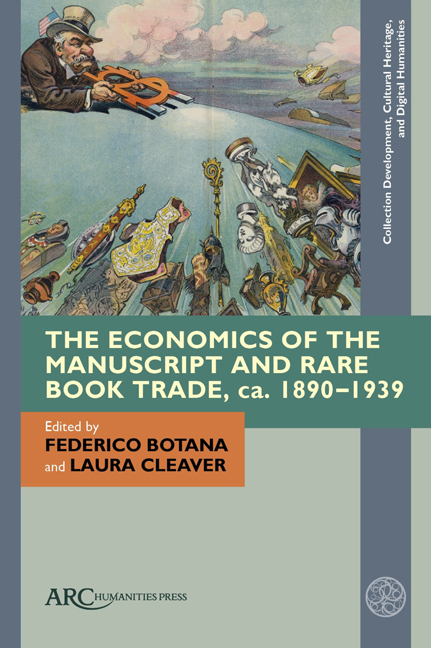Book contents
- Frontmatter
- Contents
- List of Illustrations
- List of Tables
- Acknowledgments
- Abbreviations
- Introduction. The Value of Rare Books
- Chapter 1 Valuing Rare Books in 1920s Germany: Prices in Jacques Rosenthal’s Bibliotheca medii aevi manuscripta
- Chapter 2 Leo S. Olschki’s Card Index and Potential Profits
- Chapter 3 Stock-books and Ledgers: J. & J. Leighton and Édouard Rahir and Company ca. 1897–1904 and E. P. Goldschmidt and Company ca. 1925–1933
- Chapter 4 Léopold Delisle, Henri Omont, and the Price of National Collecting: The Medieval Manuscript Acquisitions of the Bibliothèque nationale ca. 1900–1910
- Chapter 5 Herschel V. Jones: Public Collections and Private Investments
- Conclusion
- Appendix 1 Inflation
- Appendix 2 Exchange Rates
Chapter 5 - Herschel V. Jones: Public Collections and Private Investments
Published online by Cambridge University Press: 28 March 2024
- Frontmatter
- Contents
- List of Illustrations
- List of Tables
- Acknowledgments
- Abbreviations
- Introduction. The Value of Rare Books
- Chapter 1 Valuing Rare Books in 1920s Germany: Prices in Jacques Rosenthal’s Bibliotheca medii aevi manuscripta
- Chapter 2 Leo S. Olschki’s Card Index and Potential Profits
- Chapter 3 Stock-books and Ledgers: J. & J. Leighton and Édouard Rahir and Company ca. 1897–1904 and E. P. Goldschmidt and Company ca. 1925–1933
- Chapter 4 Léopold Delisle, Henri Omont, and the Price of National Collecting: The Medieval Manuscript Acquisitions of the Bibliothèque nationale ca. 1900–1910
- Chapter 5 Herschel V. Jones: Public Collections and Private Investments
- Conclusion
- Appendix 1 Inflation
- Appendix 2 Exchange Rates
Summary
IN THE AMERICAN imagination of the early twentieth century, rare books and economic value were firmly united. With detailed accounts of lucrative library sales and front-page headlines, the press ensured that even lay audiences were aware of record-breaking book sales, particularly following the auction of the library of Robert Hoe III, which began in 1911. As book sales captured public interest, increased speculation in the early-twentieth-century rare book trade was probably inevitable. Such was the perceived profitability of rare books that unscrupulous sellers were prepared to take advantage of naïve buyers, and stories of rare book fraud surfaced in the press. In 1912, The New York Times reported that the Federal government had indicted eleven men for committing $5,000,000 worth of rare book fraud, stating that the “alleged fraud for which these men were indicted consisted in the deception of persons with more money than knowledge of books.” The swindle had been profitable for at least ten years, indicating that from the start of the twentieth century, the rare book trade had gained acceptance as a dazzling yet bewildering business, blending the satisfaction of material consumption with the lure of social pretensions.
The American press typically characterized the most successful collectors as investing heavily and swiftly when opportunities arose, recognizing that supplies were limited, and market values were only moving upwards—a narrative that left naïve buyers open to exploitation. The fact that fraudsters were able to extract large sums from victims with little or no prior trade experience, points to wider perceptions of the market’s dependability and profitability. Not all the victims were even bibliophiles. One man, named in the press as “Levingston of Saratoga Springs,” was simply looking to make a short-term investment, believing that the rare books he purchased “would be resold in a short time at a considerable profit to a millionaire who was nibbling at them.” Lev ingston reportedly lost $153,000. Contemporary collectors likely felt little sympathy for Levingston, and members of the trade could be openly critical of investment collecting. The dealer A. S. W. Rosenbach informed The New York Times that he “had no sympathy with collectors who purchase books primarily for speculation.” American Book-Prices Current responded to speculation in stronger terms:
woe to him who buys solely as an investment and feels not within him the bibliophilistic spark. Dust and ashes is like to be his portion.
- Type
- Chapter
- Information
- Publisher: Amsterdam University PressPrint publication year: 2024



